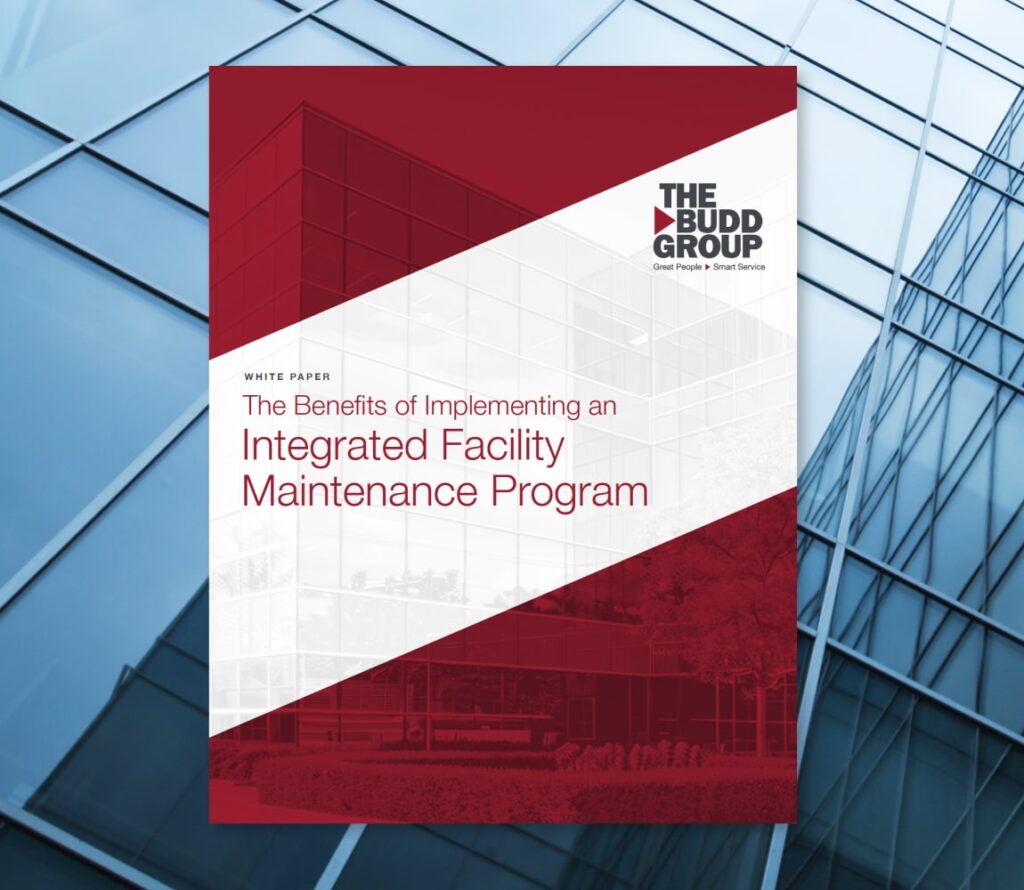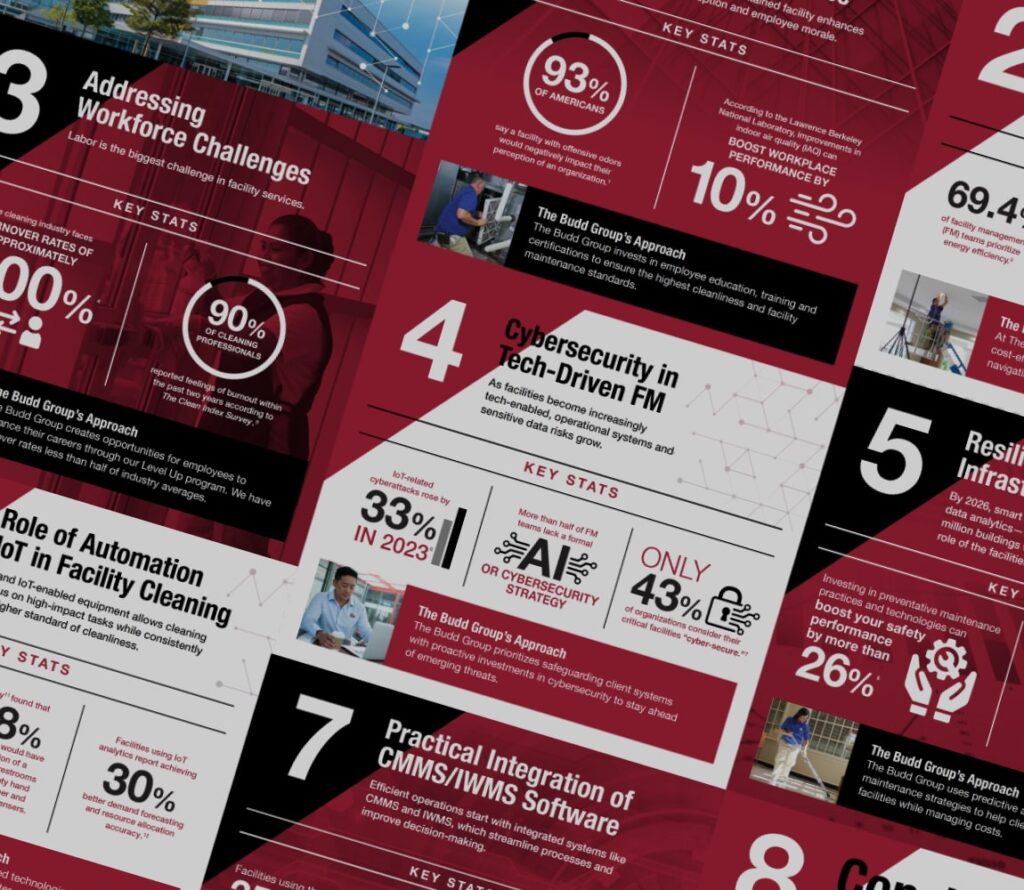The education sector has faced challenges and opportunities in its facility management as trends and innovations continue to evolve. As a leader in facility maintenance, we encourage you to consider the successes and failures of the past year as a blueprint for future improvements. By embracing these insights and solutions, you can pave the way for a more efficient, sustainable, and effective facilities maintenance strategy for 2024.
Six Facility Maintenance Lessons to Implement Moving Forward
1. Reducing Downtime by Adding Inspections to Your Calendar
Routine facility maintenance checks are critical in identifying potential issues before they escalate into major problems. In many cases, the cost of addressing minor issues early on is significantly lower than dealing with larger, more complex problems later. Regular inspections can reveal early signs of wear and tear in high-traffic areas, potential safety hazards, or inefficiencies in energy usage. The Budd Group employs skilled professionals who can identify and address issues promptly and efficiently.
In educational settings, where the well-being of students and staff is paramount, undetected maintenance issues can quickly become safety hazards. The Budd Group’s approach to regular inspections includes a detailed assessment of all facility components, ensuring compliance with all regulatory requirements and peace of mind for facility managers, educators, and students alike.
2. Reactive vs. Proactive Maintenance Approaches
The past year has underscored the distinction and importance of reactive versus proactive maintenance approaches in facility management. Reactive maintenance, which involves addressing problems as they arise, has traditionally been the norm. However, this approach often leads to unexpected downtime, higher costs, and increased inconvenience for occupants. The education sector, with its tight schedules and budget constraints, particularly feels the impact of unplanned maintenance issues. The Budd Group’s experience points toward the greater efficiency and cost-effectiveness of a proactive maintenance approach. This strategy involves anticipating and resolving potential issues before they escalate, reducing the likelihood of emergencies and the associated disruptions they cause.
Shifting to a proactive maintenance model requires a change in mindset and operations, but the benefits are substantial. For educational facilities, this means less disruption to classes and activities and a more consistent learning environment. Companies like The Budd Group can assist in this transition by providing comprehensive maintenance planning and predictive maintenance services. Utilizing advanced diagnostics and regular check-ups, the team identifies and addresses potential issues promptly, ultimately saving time and resources in the long run.
3. Technology Integration
In recent years, and particularly in the last one, the role of technology in a facility maintenance service offering has become increasingly prominent, from enhanced efficiency to more accurate tracking and reporting. In educational facilities, leveraging technology can significantly improve maintenance outcomes. The Budd Group has been at the forefront of incorporating technological solutions into maintenance practices, utilizing tools like IoT (Internet of Things) sensors, automated management systems, and data analytics to predict and address maintenance needs proactively.
Smart systems can monitor energy usage, identify areas of waste, and suggest improvements, leading to reduced operational costs and a smaller environmental footprint. The Budd Group’s approach to integrating these technological solutions not only aligns with modern maintenance practices but also demonstrates a commitment to sustainability and innovation.
4. Budgeting and Resource Allocation
For facility managers, particularly in the education sector, balancing the need for comprehensive maintenance with budgetary constraints is a constant challenge. The key is to allocate resources in a manner that maximizes efficiency and minimizes waste without compromising the quality of maintenance services. The Budd Group understands this delicate balance and works closely with clients to develop customized maintenance plans that fit within their budgetary framework. This involves prioritizing maintenance tasks, employing cost-effective methods, and optimizing resource use to ensure that every dollar spent contributes to the upkeep and improvement of the facility.
In addition to strategically allocating resources, adopting a long-term perspective in budgeting can lead to significant savings and enhanced facility performance. Investing in preventative maintenance, for instance, may require upfront costs but can prevent expensive repairs and replacements in the future. Similarly, incorporating sustainable practices and energy-efficient solutions can result in lower operational costs over time. By getting insights into the lifecycle costs of facility components and the potential ROI of various maintenance activities, you can make informed decisions that benefit your facilities in the long run.
5. Environmental Sustainability
The emphasis on environmental sustainability in building maintenance services has grown significantly in recent years. For schools, implementing sustainable practices in facility maintenance is not just about reducing environmental impact; it’s also about setting a positive example for students and the community. Sustainable maintenance practices include using eco-friendly cleaning products, implementing energy-efficient systems, and managing waste responsibly. The Budd Group recognizes the importance of these practices and integrates them into its comprehensive maintenance services, aiding facilities in achieving their sustainability goals while maintaining high standards of cleanliness and efficiency.
Adopting sustainable maintenance practices also involves assessing the carbon footprint of maintenance activities and finding ways to minimize it. For instance, optimizing the use of natural light, implementing green cleaning practices, and using energy-efficient HVAC systems can significantly reduce a facility’s environmental impact. The Budd Group collaborates with educational institutions to develop and implement such sustainable strategies, ensuring that the maintenance processes are not only effective but also align with the broader environmental values of the institution.
6. Communication and Collaboration
For educational institutions where various stakeholders are involved, maintaining clear and consistent communication channels is essential. It ensures that all parties are aware of ongoing maintenance activities, potential disruptions, and updates. The Budd Group excels in establishing robust communication protocols with clients, ensuring that facility managers, administrative staff, and other relevant parties receive consistent updates. This transparency not only fosters trust but also facilitates smoother operation and coordination of maintenance tasks.
Collaboration, particularly in a school or college setting, extends beyond just the interaction between the maintenance provider and the institution’s administration. It involves engaging with educators, students, and sometimes even parents to ensure that maintenance activities align with the institution’s schedules and events. The Budd Group practices a collaborative approach, working closely with all stakeholders to understand their needs and concerns. This collaborative effort ensures that maintenance solutions are not only effective but also tailored to the unique environment of each educational facility.
The Budd Group Is Your Facility Maintenance Expert
What is the most useful thing you learned in facilities management? Reflecting on the past year’s lessons in facility maintenance presents an invaluable opportunity for growth and improvement, especially in a dynamic school environment. The Budd Group, with our rich experience and commitment to excellence, stands as a guiding partner in this journey. By incorporating these lessons and strategies, facility managers at educational institutions and beyond can look forward to a more efficient, sustainable, and effective maintenance program in the current calendar year.
The Budd Group is poised to continue leading the way in facility maintenance, offering solutions that are not only aligned with the latest trends and best practices but also customized to meet the unique needs of each educational facility. With The Budd Group as a trusted partner, schools and facilities of all types can confidently navigate the challenges of facility maintenance, ensuring their spaces are not just well-maintained but also conducive to learning, growth, and innovation.
We offer a vast array of facility maintenance services as well as a suite of other offerings, including janitorial, landscaping, and more. We’ve been providing these services to clients across sectors and throughout the Southeast United States for over 60 years. Contact us today to discuss your facility’s needs and how we might be able to help meet them.

